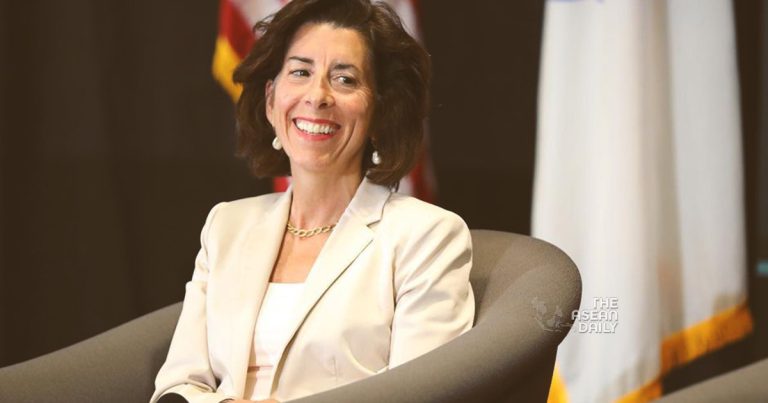27-8-2023 (BEIJING) Gina Raimondo, the U.S. Commerce Secretary, arrived in Beijing on Sunday for a four-day visit with the primary objective of enhancing economic relations between the world’s two largest economies. She made it clear that American national security trade measures are non-negotiable but emphasized the importance of open dialogue.
In a statement before her departure, Raimondo articulated her mission as follows: “If you wanted to put a tagline to the trip and the mission, it’s protect what we must and promote where we can. I’m not going to pull my punches next week when I am there, but I intend to be practical.”
Tensions persist as the United States collaborates with its allies to limit China’s access to advanced semiconductors. Simultaneously, Beijing has imposed restrictions on shipments from prominent chip company Micron Technology and levied a $1.5 million fine on the U.S. firm Mintz Group for “unapproved statistical work.”
Raimondo had a conversation with President Joe Biden before her visit, during which he stressed the significance of enhanced dialogue with China in easing tensions. “We want to have a stable commercial relationship, and core to that is regular communication,” Raimondo said. “We need to communicate to avoid conflict.”
Republicans in Congress have expressed concerns about the possibility of Raimondo establishing a working group with China during her visit to discuss U.S. semiconductor export controls. Although Raimondo did not confirm plans for any working group, she emphasized that when it comes to national security, negotiation, concessions, and compromise are not on the table.
The United States has been using government incentives and tax policies to encourage American businesses to reduce their dependence on Chinese supply chains and boost domestic semiconductor production. Raimondo clarified, “Just because we’re investing in America does not mean at all that we want to decouple from China’s economy.”
China’s ambassador to the United States, Xie Feng, who met with Raimondo last week, expressed China’s desire for “mutual respect, peaceful coexistence, and win-win cooperation.”
In a significant development, the White House has initiated steps to restrict certain U.S. investments in sensitive technologies in China. It also plans to finalize extensive export restrictions on advanced semiconductors, measures initially adopted in October.
Raimondo, the fourth high-level U.S. official to visit China recently, holds the distinction of being the first commerce secretary to visit in seven years. She engaged with over 100 senior business leaders prior to her visit and pledged to address their concerns.
Wendy Cutler, vice president of the Asia Society Policy Institute, remarked that given the potential visit of President Xi Jinping to the U.S. in less than three months, “Beijing has an interest in working with the United States to identify practical areas in the economic relationship where cooperation may be possible.”
During her visit to Beijing and Shanghai, Raimondo also aims to bolster travel and tourism between the two nations. China and the United States recently agreed to double the number of permitted flights between them, although it remains a fraction of pre-COVID levels. Raimondo estimated that if China could return to 2019 U.S. tourism levels, it would contribute $30 billion to the U.S. economy and generate 50,000 jobs.
Additionally, Raimondo is contemplating a visit to Shanghai Disneyland, a joint venture between Walt Disney and the Chinese state-owned Shendi Group, according to a source.
Another question looming is when Chinese airlines might resume deliveries of Boeing 737 MAX jets after a four-year hiatus. In 2021, Raimondo stated that the Chinese government was preventing its airlines from purchasing “tens of billions of dollars” worth of Boeing aircraft. Boeing has expressed readiness to deliver airplanes to Chinese airlines “when that time comes.”




